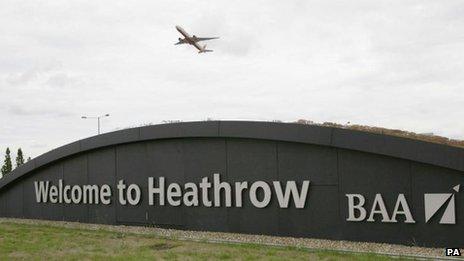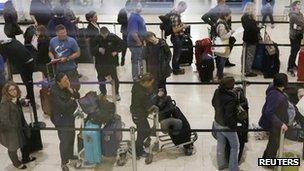Runways and economic lift-off
- Published
- comments

To tell you what you know, the UK is an economy with unsustainably large imbalances.
The income we receive from the rest of the world, from what we export and from our overseas investments, has for 30 years been too small to cover what we buy abroad. Which is one important reason why the indebtedness of the nation, or the sum of government, business and household debts, is unsustainably large and rising.
And, the gap between what the government spends and receives from tax revenues is also widely seen as unsustainably large, and not falling fast enough (sorry I am lingering on the blimmin' obvious).
Now there are only two ways to deal with such imbalances.
One way is austerity: households can save more, buy less and become reconciled to diminished living standards and less opulent lifestyles; governments can reduce their expenditure and put up taxes.
The other way is to promote growth, especially of trade and inward investment, so that the gap narrows between exports and imports, and activity in the UK revives to boost tax revenues for the government.
The hub effect
Now you might think that growth sounds like far and away the most attractive of the two options: it would allow us to sustain and even possibly improve our standard of living, whereas austerity is all about accepting that we've been living beyond our means.

Heathrow is more-or-less at full capacity
But if you thought promoting growth was the easier option, well I have only one word to say to you: "Heathrow".
To explain.
There is a consensus that an open trading economy like the UK's requires what is known as a "hub airport".
This is an airport which serves lots of destinations all over the world with direct flights, and caters for vast numbers of passengers in transit between destinations.
There is evidence that the benefit of a hub airport is not just in the direct travel revenues it generates but in the way it stimulates trade, and persuades overseas businesses to open offices and plant near the airport.
Quantifying these benefits is not a precise science, but Frontier Economics estimates that a better London hub would add up to £2bn to trade.
Here is the thing: Heathrow is Europe's biggest hub airport, but it is more-or-less at full capacity and is creaking; so it has seen important new flight routes, to fast growing Chinese cities (for example), gravitate to rival hubs, such as Frankfurt. And that brings the risk that Chinese businesses will set up shop near Frankfurt, and not in Britain.
Which is why, as various ministers and officials have said to me many times since the election, the infrastructure project that would probably do more than others to stimulate growth would be building one or two additional runways at Heathrow.
But, of course, almost the first action of the coalition government was to do the opposite, by shelving plans for the expansion of Heathrow.
However, recognising it may have been a bit hasty, the government then set up a commission, under Sir Howard Davies, to make a recommendation in 2015 on the best option for ensuring that the UK continues to have Europe's leading airport hub.
Too late?
The point is that for all the likely economic benefits of adding to Heathrow's capacity, the political cost was seen by the government to be too great: alienating those who fear their lives would be ruined by increased noise pollution and a deterioration of air quality was just too scary.
Does this reveal a flaw in the ability of the coalition to make tough decisions? Some would say it does, although that would be to ignore 50 years of dithering by successive British governments about whether to embark on the kind of infrastructure modernisation that comes more naturally to the Chinese, Americans and French.
So today Heathrow is lobbying Davies's commission to show favour on one of the three sites it has identified for an additional runway - and reject rival proposals from Gatwick and Stansted, and the ambitious project championed by London's mayor to flatten Heathrow, construct new homes and businesses on the released land and build a whole new hub to the east of London.
Anyway, even with a following wind (which doesn't exist), none of this will happen for many years (the earliest a new runway Heathrow could open, given the political, planning and construction timetables, is 2025 - and that would be for the option that delivers the least capacity gain for the most disruption to residents).
By which time, the moment of maximum benefit for the British economy may well have long gone.